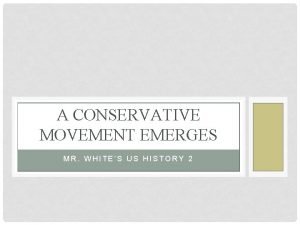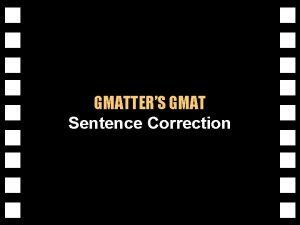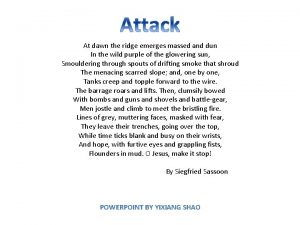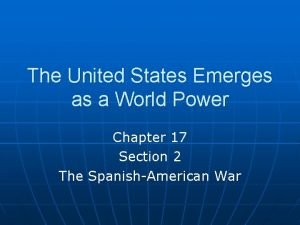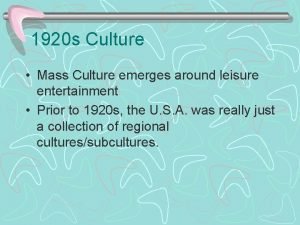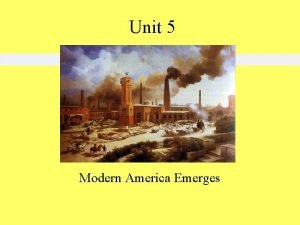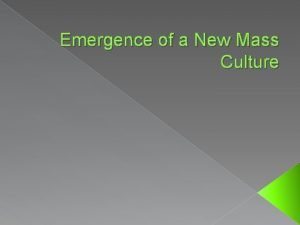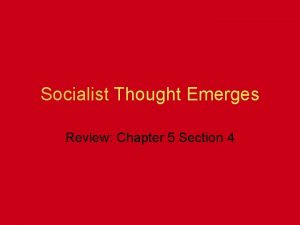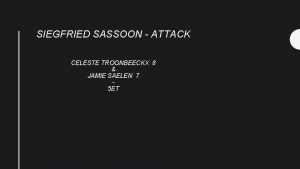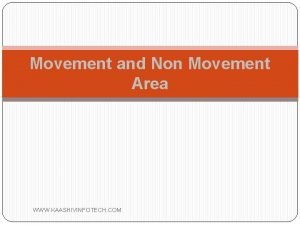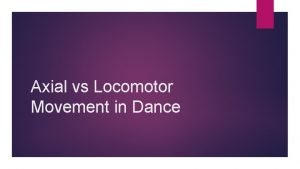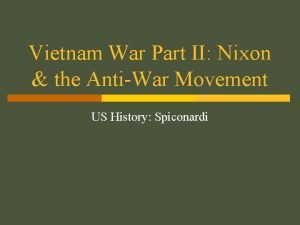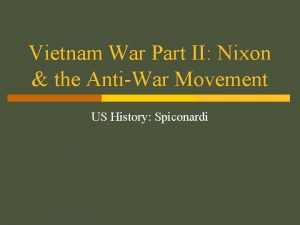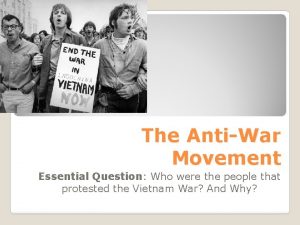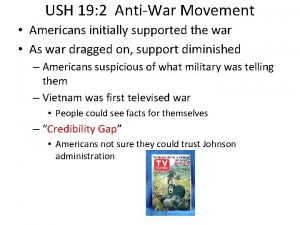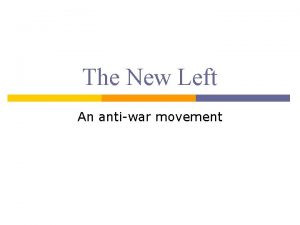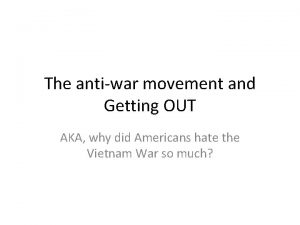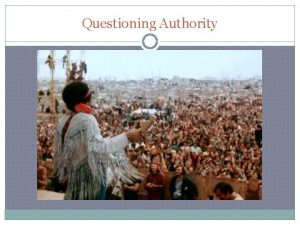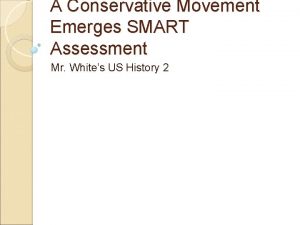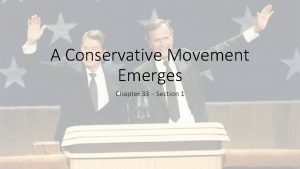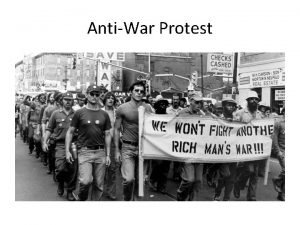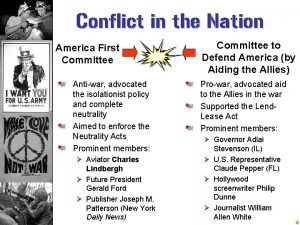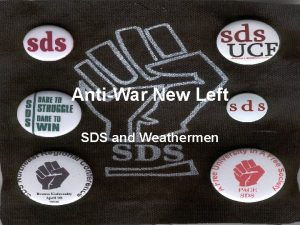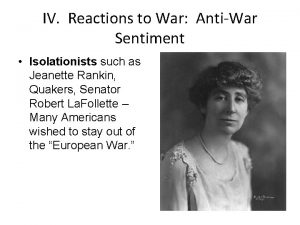The AntiWar Movement AntiWar Movement Emerges As the
















- Slides: 16

The Anti-War Movement

Anti-War Movement Emerges • As the war dragged on in Vietnam, the public • • support dropped Suspicion of the government’s truthfulness about the war grew In the early years of the war, General William Westmoreland had reported the enemy was on the verge of defeat, but the war continued on for years

Anti-War Movement Emerges • Media accounts from reporters stationed overseas told a more depressing story – Aired footage of battle deaths, women and children fighting, and other guerilla tactics • Vietnam was the first “televised war” with footage of combat appeared nightly in American homes • Credibility gap it was hard to believe what the Johnson administration said about the war

The First D. C. Rally • April 17, 1965 – One month after the U. S. sent its first troops to Vietnam – Staged by the Leftist group, Students for a Democratic Society – 16, 000 people picketed outside the White House • “No More War” • “We Want Peace Now” – Only 4 arrests made

Teach-ins Begin • March 1965 a group of faculty members and students at the University of Michigan joined together at a teach-in – They discussed issues surrounding the war and reaffirmed their reasons for opposing it • May 1965 122 colleges held a “National Teach • In” by radio for more than 100, 000 people People opposed the war for many reasons, and this gave them a forum to discuss those reasons

March on the Pentagon October 21, 1967 – Culmination of 5 days of protests organized by the National Mobilization Committee to End the War in Vietnam – Famous speakers came to address the crowd (Robert Lowell, Benjamin Spock) – The protest escalated when the leaders of the Youth International Party announced they were going to “exorcise” the Pentagon • People surrounded the building and chanted spells to try and drive out the “evil war spirits” – “LBJ, Pull Out Now, Like Your Father Should Have Done. ” • Tear gas was released into the crowd • 2, 500 troops guarded the Pentagon • 681 arrested

The Moratorium Rally (D. C. ) • November 15, 1969 – America’s biggest anti- war demonstration ever • 250, 000 - 500, 000 protestors present – A little less wild • LBJ was out of office and Nixon had initiated his “Vietnamization” plan • Police had learned how to handle protests – 3, 000 Police, 9, 000 Army troops, 200 Lawyers, 75 Clergymen – Protest was peaceful for the most part • 135 arrests made

Anger at the Draft • 500, 000 draftees refused to go when called • Some burned their draft cards, did not show up for • • • induction, or fled the country Between 1965 -69, the government prosecuted 3, 300 Americans who refused to serve the war April 1965 Students for a Democratic Society marched on Washington with 20, 000 people Arguments over the draft fueled debate over voting age – 1971 26 th Amendment lowered the national voting age to 18 due to the American response to the draft

Anger at the Draft • Until 1969, a college student was able to defer • • military service until after graduation Therefore, young people from working-class families were more likely to be drafted and sent to war because they could not afford college Draftees were more likely to be assigned to dangerous combat units 1969 Draftees made up 62% of battle deaths Majority of the soldiers during Vietnam were volunteer enlistees because it provided vocational training and a source of upward mobility

Kent State • In response to Nixon’s invasion of Cambodia – Didn’t want to be drafted • May 1, 1970 - Day One – Huge demonstration on the College’s commons – Around midnight rowdy bikers began throwing bottles and vandalizing cars in the street – Approximately 100 students joined in – Police eventually got the situation under control

Kent State (cont. ) May 2, 1970 - Day Two – State of Emergency declared in Kent • Ohio Governor, James A. Rhodes, called in the National Guard – Demonstrations continued on campus • Reserve Officer Training Corps building was set on fire – Fire men and police were pelted with rocks by the surrounding crowd – 10: 00 p. m. - National Guard set up camp on Kent State’s campus • Used tear gas and arrested the protestors • At least one person was bayoneted May 3, 1970 - Day Three – More protests – Curfew imposed on students

Kent State (cont. ) May 4, 1970 - Day Four – Pre-planned rally commenced • Approx. 2, 000 people present – National Guard told them to disperse • People refused • Troops sprayed the crowd with tear gas – Crowd began throwing rocks and chased the National Guard off campus • “Pigs off Campus!” – After being chased up a hill by the angry protestors, the National Guard opened fire on the crowd • Firing lasted 13 seconds • 4 dead • 9 wounded

Anti-War Slogans • Common slogans and chants • "Hey, hey LBJ, how many kids have you • • killed today? " The chant "One, two, three, four! We don't want your f***ing war!" was chanted repeatedly at demonstrations throughout the U. S. in the late 1960 s and early 1970 s. "Draft Beer, not boys", "Hell no, we won't go", "Make love, not war", "Eighteen today, dead tomorrow",

Distrust Continues with Nixon • 1971 - Pentagon Papers leaked to the press • Showed that the U. S. had deliberately expanded its involvement in Vietnam • This was happening while Pres. Lyndon Johnson was telling the American people that the U. S. would not expand its involvement, but negatively affected Nixon

Vietnam Protest Songs • (I Feel Like I’m) Fixin’ to Die Rag – Country Joe • • • and the Fish (1967) Fortunate Son – Creedence Clearwater Revival (1969) Gimme Shelter – Rolling Stones Imagine - John Lennon (1971) War - The Temptations, later covered by Edwin Starr (1970) The Unknown Soldier - The Doors (1968) What's Going On - Marvin Gaye (1971)

Hawks and Doves • Hawks those who insisted that the country stay and fight the war • Doves those who wanted the United States to withdraw from Vietnam
 A conservative movement emerges
A conservative movement emerges As a baby emerges from the darkness of the womb
As a baby emerges from the darkness of the womb At dawn the ridge emerges massed and dun
At dawn the ridge emerges massed and dun United states acquisitions and annexations 1857-1904
United states acquisitions and annexations 1857-1904 Modern mass culture emerges leisure
Modern mass culture emerges leisure Modern america emerges
Modern america emerges Modern mass culture emerges leisure
Modern mass culture emerges leisure Socialist thought emerges
Socialist thought emerges At dawn the ridge emerges massed and dun
At dawn the ridge emerges massed and dun Non-movement area
Non-movement area What are locomotor and axial movements?
What are locomotor and axial movements? Từ ngữ thể hiện lòng nhân hậu
Từ ngữ thể hiện lòng nhân hậu Diễn thế sinh thái là
Diễn thế sinh thái là Slidetodoc
Slidetodoc Thế nào là giọng cùng tên?
Thế nào là giọng cùng tên? 101012 bằng
101012 bằng Alleluia hat len nguoi oi
Alleluia hat len nguoi oi
